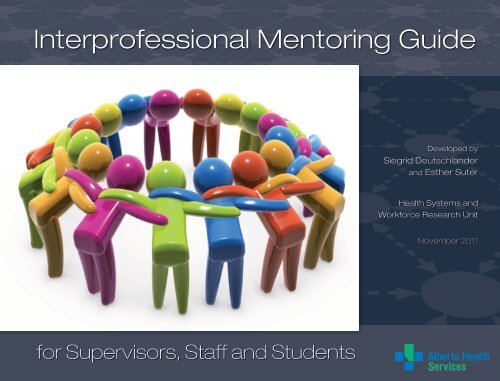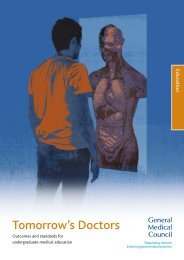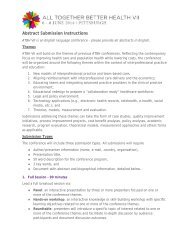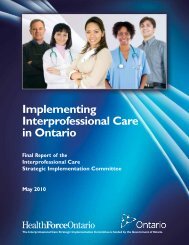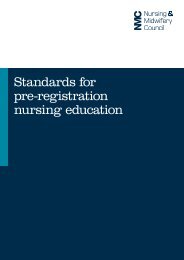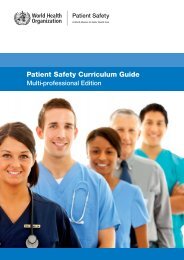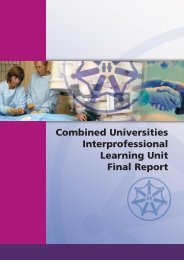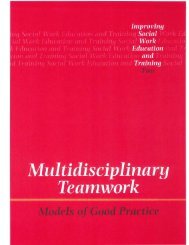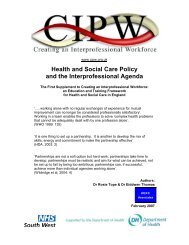Interprofessional Mentoring Guide - Alberta Health Services
Interprofessional Mentoring Guide - Alberta Health Services
Interprofessional Mentoring Guide - Alberta Health Services
Create successful ePaper yourself
Turn your PDF publications into a flip-book with our unique Google optimized e-Paper software.
<strong>Interprofessional</strong> <strong>Mentoring</strong> <strong>Guide</strong><br />
Developed by<br />
Siegrid Deutschlander<br />
and Esther Suter<br />
<strong>Health</strong> Systems and<br />
Workforce Research Unit<br />
November 2011<br />
for Supervisors, Staff and Students
I<br />
Definitions<br />
This guide refers to content from a number of publications which use different terms for some of the concepts.<br />
The concepts are defined as follows:<br />
Collaborative Practice/<br />
<strong>Interprofessional</strong> Collaboration: These<br />
terms are used interchangeably and<br />
refer to a process of communication<br />
and decision-making that enables<br />
the separate and shared knowledge<br />
and skills of healthcare providers to<br />
synergistically influence client/patient<br />
care (Way et al. 2000).<br />
<strong>Interprofessional</strong> Competencies/<br />
Collaborative Practice Competencies:<br />
These terms are used interchangeably<br />
and refer to the knowledge and<br />
skills healthcare providers require to<br />
effectively engage in collaborative<br />
practice (see CIHC National<br />
<strong>Interprofessional</strong> Competency<br />
Framework 2010).<br />
<strong>Interprofessional</strong> Competency<br />
Framework: A national consensus<br />
document developed by the Canadian<br />
<strong>Interprofessional</strong> <strong>Health</strong> Collaborative<br />
outlining interprofessional<br />
competencies (2010).<br />
<strong>Interprofessional</strong> Practice Education:<br />
Practice education is the umbrella<br />
term referring to all aspects of<br />
student clinical placements, within<br />
both the educational institution and<br />
practice setting. <strong>Interprofessional</strong><br />
practice education refers to practice<br />
education where students can learn<br />
from other professions and develop<br />
collaborative practice skills during<br />
their clinical placements (adapted<br />
from <strong>Interprofessional</strong> Education for<br />
Collaborative Patient-Centred Practice<br />
2006).<br />
<strong>Interprofessional</strong> Mentor: A<br />
healthcare practitioner who<br />
facilitates, supervises and evaluates<br />
interprofessional learning for students<br />
from other disciplines during their<br />
clinical placement (Marshall and<br />
Gordon 2005).<br />
<strong>Interprofessional</strong> Education: brings<br />
together healthcare providers<br />
from different professions to learn<br />
with, from and about each other<br />
to enhance collaborative practice<br />
and the quality of patient care<br />
(Centre for the Advancement of<br />
<strong>Interprofessional</strong> Education 2002).<br />
It refers to pre- and postlicensure<br />
learners. Interpofessional education<br />
is considered an effective strategy to<br />
teach students about collaborative<br />
practice.<br />
Collaborative Practice-Ready<br />
Workforce: Comprises healthcare<br />
providers who have learned to work<br />
in an interprofessional team and are<br />
competent to do so (World <strong>Health</strong><br />
Organization 2010).<br />
IP Practice Education<br />
© <strong>Health</strong> Systems and Workforce Research Unit, <strong>Alberta</strong> <strong>Health</strong> <strong>Services</strong>, November 2011<br />
<strong>Health</strong> Canada and <strong>Alberta</strong> <strong>Health</strong> & Wellness provided funding for developing this<br />
material as part of the <strong>Interprofessional</strong> Collaborative Practice & Learning Environment<br />
project, 2010-2011.<br />
For further information on this material, please contact:<br />
Siegrid.Deutschlander@albertahealthservices.ca (403.943.0549)<br />
Esther.Suter@albertahealthservices.ca (403.943.0183)
I<br />
IP Practice Education<br />
Section I<br />
<strong>Interprofessional</strong><br />
Practice Education<br />
This guide was developed for healthcare<br />
practitioners and students to support<br />
interprofessional practice education for<br />
students at the workplace setting. In its<br />
framework for action, the World <strong>Health</strong><br />
Organization (WHO 2010) has appealed to<br />
policy-makers, educators and healthcare<br />
providers to build a “collaborative practiceready<br />
workforce” in education and practice.<br />
Working collaboratively implies a partnership<br />
between healthcare providers from across<br />
disciplines and the patients/families in a<br />
coordinated approach to shared decisionmaking<br />
about patients’ care. <strong>Health</strong>care<br />
training must integrate intentional education<br />
strategies to promote collaborative practice<br />
between providers and students from<br />
different disciplines. These strategies are<br />
particularly effective when embedded in<br />
students’ placements at practice settings<br />
during their training years.<br />
One such strategy is interprofessional<br />
mentoring, which encourages students<br />
and staff from different disciplines to<br />
learn “with, from and about each other.”<br />
This type of formal interprofessional<br />
education aims at promoting collaborative<br />
practice and enhancing the quality of care<br />
through the intentional development of<br />
interprofessional competencies. Within<br />
an interprofessional mentoring approach,<br />
each healthcare practitioner acts as an<br />
“interprofessional mentor” and creates<br />
interprofessional learning opportunities for<br />
students to interact and learn with, from<br />
and about other health disciplines. In this<br />
arrangement, students work with a range of<br />
different practitioners at their setting. The<br />
interprofessional mentoring experiences take<br />
place in addition to formal, discipline-specific<br />
preceptorship/clinical supervision. While<br />
discipline-specific skills development remains<br />
the focus of interprofessional practice<br />
education, the collaborative practice model<br />
of healthcare delivery highlights the need to<br />
formally recognise, include and address the<br />
need for an interprofessional component of<br />
practice education.
Through interprofessional mentoring,<br />
students are taught about interprofessional<br />
competencies and collaborative practice.<br />
Debriefings, reflections and evaluation of<br />
interprofessional competencies (such as<br />
roles, shared decision-making) are critical<br />
to the interprofessional mentoring process<br />
(adapted from Freeth et al. 2005). Immediate<br />
learning outcomes for students include role<br />
clarity, understanding of decision-making<br />
and guidelines for other professions and<br />
communication skills across professions.<br />
When implemented to its fullest, the<br />
interprofessional mentoring of students is<br />
shared among the members of a team rather<br />
than being the sole responsibility of the<br />
discipline-specific, primary supervisor.<br />
Evidence from research and practice suggests<br />
that placements with interprofessional<br />
learning opportunities are attractive for<br />
students and that graduates who have been<br />
involved in an interprofessional practice<br />
education tend to return to these sites<br />
for employment. In that sense, we view<br />
interprofessional mentoring as a recruitment<br />
strategy. Placements that give students<br />
exposure to the work of team members<br />
other than their discipline-specific advisor<br />
help facilitate the integration of students into<br />
the practice site team, thereby easing the<br />
transition from student to practitioner.<br />
Sharing the responsibility for students among<br />
all practitioners lessens the burden on the<br />
primary supervisor and fosters a collaborative<br />
mentorship culture (Callaghan et al. 2009).<br />
However, not all healthcare practitioners<br />
are trained in collaborative practice or are<br />
familiar with the competencies required to<br />
collaborate effectively and be comfortable<br />
in evaluating students’ interprofessional<br />
competencies. The <strong>Interprofessional</strong> Practice<br />
Education Model was developed to help<br />
staff embed interprofessional mentoring into<br />
student clinical placements and to prepare<br />
students for collaborative practice.
Figure 1: The <strong>Interprofessional</strong> Practice Education Model<br />
The IP Practice Education Model
I<br />
II<br />
The IP Practice Education Model<br />
IP Practice Education<br />
IP <strong>Mentoring</strong>
II<br />
IP <strong>Mentoring</strong><br />
Section II<br />
<strong>Interprofessional</strong> <strong>Mentoring</strong><br />
<strong>Interprofessional</strong> mentoring encourages professional<br />
exchanges between students and staff from different<br />
disciplines to enhance students’ competencies for<br />
collaborative practice. Besides their discipline-specific<br />
supervisors, students at practice sites can rely on team<br />
members from other disciplines to act as interprofessional<br />
mentors. Together, the discipline-specific supervisors and<br />
interprofessional mentors share the responsibility for<br />
meeting students’ interprofessional learning objectives.<br />
As a shared approach to student practice education,<br />
interprofessional mentoring lessens the burden on<br />
individual staff members and fosters a collaborative<br />
mentorship culture.<br />
In interprofessional mentoring, the roles of supervisors and<br />
other healthcare practitioners are to:<br />
“facilitate interprofessional learning and<br />
supervise and evaluate students’ interprofessional<br />
competencies within the practice setting.”<br />
(Adapted from Marshall & Gordon 2005)<br />
Expectations of<br />
<strong>Interprofessional</strong> Mentors<br />
Each interprofessional mentor is responsible for<br />
facilitating, supervising, and evaluating students from<br />
different disciplines. The interprofessional mentor<br />
facilitates interprofessional learning opportunities<br />
by engaging students in activities that illustrate their<br />
professional roles and collaboration with others. The<br />
interprofessional mentor can assist a student to set learning<br />
goals and expectations for these interprofessional learning<br />
opportunities. The learning goals should link directly to the<br />
interprofessional competencies.<br />
<strong>Interprofessional</strong> mentors supervise students during<br />
the interprofessional learning activities. Debriefings<br />
are a crucial part of supervising students by helping<br />
them examine collaborative practice: the role of various<br />
providers in delivering services, gaps in available services,<br />
the involvement of clients, the level of collaboration<br />
between providers, systems issues, etc. Asking thoughtprovoking<br />
and critical questions about client care and team<br />
functioning becomes integral to the students’ learning.<br />
Having team members from different disciplines act as<br />
interprofessional mentors supports discipline-specific<br />
supervisors in their final task of evaluating students’<br />
collaborative accomplishments. While interprofessional<br />
mentors are not expected to evaluate students’ disciplinespecific<br />
competencies, they should be able to assess any<br />
progress students have made in the interprofessional<br />
competencies as outlined in the CIHC Competency<br />
Framework. Therefore, debriefing with students and<br />
evaluating their performance on interprofessional<br />
Expectations of IP Mentors
Expectations of IP Mentors<br />
competencies are crucial pieces in the learning potential<br />
that interprofessional mentoring offers. These activities<br />
differentiate interprofessional mentoring from informal<br />
or incidental interprofessional opportunities (such as<br />
occasional shadowing) which have limited interprofessional<br />
learning potential (for example, the development of<br />
interprofessional knowledge and skills).<br />
Expectations of Students<br />
The acquisition of interprofessional competencies should be<br />
integral to every student’s learning objectives. Students are thus<br />
expected to set clear learning objectives for interprofessional<br />
competencies and fully participate in debriefings with<br />
interprofessional mentors around these competencies. Since some<br />
of the interprofessional competencies are part of every discipline’s<br />
professional practice (patient-centred care, role clarification,<br />
communication), they should be addressed in depth. The students<br />
play a crucial role in their own learning and are responsible for<br />
contributing to their evaluations in the following ways:<br />
Expectations of Students<br />
• Integrate the interprofessional competencies into learning<br />
plans: choose one/several competencies as your learning<br />
objective(s) and state at the beginning of your placement.<br />
• Carry out interprofessional mentoring activities (at minimum,<br />
attend team meetings): your placement setting offers numerous<br />
opportunities for engaging with other practitioners (even if you<br />
are just observing).<br />
• Track the debriefings on interprofessional competencies:<br />
capture important aspects of the interprofessional<br />
competencies under discussion; add more information on a<br />
competency as you move forward.<br />
• Complete reflections on interprofessional mentoring activities:<br />
write a 3-page reflection on an interprofessional practice<br />
opportunity and competenc(ies) arising from it (briefly describe<br />
the situation and then focus on discussing the competenc(ies)).<br />
• Provide feedback to the staff at the end of your placement:<br />
prepare a short, 15-minute presentation for the team about the<br />
highlights of the placement and a collaborative aspect of the<br />
practice setting.
III<br />
Expectations of Students<br />
Most important:<br />
Take the initiative for engaging in interprofessional<br />
mentoring<br />
• Approach other practitioners to show your interest<br />
• Think about collaborative practice in your daily activities<br />
• Familiarize yourself with the <strong>Interprofessional</strong><br />
Competency Framework (www.CIHC.ca)<br />
National IP Competency Framework
III<br />
National IP Competency Framework<br />
Section III<br />
National Interprofesional<br />
Competency Framework<br />
Through a national consensus process, the Canadian <strong>Interprofessional</strong><br />
<strong>Health</strong> Collaborative has developed the National <strong>Interprofessional</strong><br />
Competency Framework (www.cihc.ca) outlining the competencies that<br />
are key to collaborative practice. They comprise skills and knowledge that<br />
are important in daily interactions between healthcare practitioners, their<br />
patients and students. Students should learn about these competencies<br />
during their health profession education. There are six competency<br />
domains:<br />
• Role Clarification<br />
• Team Functioning<br />
• <strong>Interprofessional</strong> Conflict Resolution<br />
• Collaborative Leadership<br />
• Patient/Client/Family/Community-Centred Care<br />
• <strong>Interprofessional</strong> Communication<br />
The CIHC document outlines the six competency domains as explained<br />
below individually although their application is interdependent of each<br />
other. Each competency shows various behaviours that, together, enact<br />
the competency to its fullest extent. The result is a dynamic and flexible<br />
foundation for collaborative learning and practice (CIHC 2010).<br />
<strong>Interprofessional</strong> Competencies<br />
Role Clarification<br />
Students/practitioners understand their own role and the roles of those in<br />
other professions, and use this knowledge appropriately to establish and<br />
achieve patient/client/family and community goals. To support interprofessional<br />
collaboration, students/practitioners are able to:<br />
• describe their own role and that of others<br />
• recognize and respect the diversity of other health and social care roles,<br />
responsibilities, and competencies<br />
• perform their own roles in a culturally respectful way<br />
• communicate roles, knowledge, skills, and attitudes using appropriate<br />
language<br />
• access others’ skills and knowledge appropriately through consultation<br />
• consider the roles of others in determining their own professional and<br />
collaborative roles<br />
• integrate competencies/roles seamlessly into models of service delivery<br />
Team Functioning<br />
Students/practitioners understand the principles of team work dynamics and<br />
group/team processes to enable effective interprofessional collaboration. To<br />
support interprofessional collaboration, students/practitioners are able to:<br />
• understand the process of team development<br />
• develop a set of principles for working together that respects the ethical<br />
values of members<br />
IP Competencies<br />
• effectively facilitate discussions and interactions among team members<br />
• participate, and be respectful of, all members’ participation in collaborative<br />
decision-making<br />
• regularly reflect on their functioning with team students/practitioners and<br />
patients/clients/families<br />
• establish and maintain effective and healthy working relationships with<br />
students/practitioners, patients/clients, and families, whether or not a<br />
formalized team exists<br />
• respect team ethics, including confidentiality, resource allocation, and<br />
professionalism
IP Competencies<br />
<strong>Interprofessional</strong> Conflict Resolution<br />
Students/practitioners actively engage self and others, including the client/<br />
patient/family, in positively and constructively addressing disagreements<br />
as they arise. To support interprofessional collaboration, team members<br />
consistently address conflict in a constructive manner by:<br />
• valuing the potential positive nature of conflict recognizing the potential for<br />
conflict to occur and taking constructive steps to address it<br />
• identifying common situations that are likely to lead to disagreements or<br />
conflicts, including role ambiguity, power gradients, and differences in goals<br />
• knowing and understanding strategies to deal with conflict<br />
• setting guidelines for addressing disagreements<br />
• effectively working to address and resolve disagreements, including analyzing<br />
the causes of conflict and working to reach an acceptable solution<br />
• establishing a safe environment in which to express diverse opinions<br />
• developing a level of consensus among those with differing views<br />
• allowing all members to feel their viewpoints have been heard no matter<br />
what the outcome<br />
Collaborative Leadership<br />
Students/practitioners understand and can apply leadership principles<br />
that support a collaborative practice model. This domain supports shared<br />
decision-making as well as leadership but it also implies continued individual<br />
accountability for one’s own actions, responsibilities and roles as explicitly<br />
defined within one’s professional/disciplinary scope of practice. To support<br />
interprofessional collaboration, students/practitioners collaboratively<br />
determine who will provide group leadership in any given situation by<br />
supporting:<br />
• work with others to enable effective patient/client outcomes<br />
• advance interdependent working relationships among all participants<br />
• facilitate effective team processes<br />
• facilitate effective decision-making<br />
• establish a climate for collaborative practice among all participants<br />
• co-create a climate for shared leadership and collaborative practice<br />
• apply collaborative decision-making principles<br />
• integrate the principles of continuous quality improvement to work processes<br />
and outcomes<br />
Patient/Client/Family/Community-Centred Care<br />
Students/practitioners seek out, integrate and value, as a partner, the input<br />
and the engagement of the patient/client/family/community in designing and<br />
implementing care/services. To support interprofessional collaboration that is<br />
patient/client/family-centred, learners/practitioners need to:<br />
• support the participation of patients/clients, their families and/or community<br />
representatives as integral partners alongside with healthcare personnel<br />
• share information with patients/clients/or family in a respectful manner and<br />
in such a way that it is understandable, encourages discussion, and enhances<br />
participation in decision-making<br />
• ensure that appropriate education and support is provided to patients/<br />
clients/family and others involved with care or service<br />
• listen respectfully to the expressed needs of all parties in shaping and<br />
delivering care or services<br />
<strong>Interprofessional</strong> Communication<br />
Students/practitioners from different professions communicate with each<br />
other in a collaborative, responsive and responsible manner. To support<br />
interprofessional collaboration, students/practitioners are able to:<br />
• establish team work communication principles<br />
• actively listen to other team members including patients/clients/families<br />
• communicate to ensure common understanding of care decisions<br />
• develop trusting relationships with patients/clients/families and other team<br />
members<br />
• effectively use information and communication technology to improve<br />
interprofessional patient/client/community-centred care
Figure 2: The National <strong>Interprofessional</strong> Competency Framework<br />
For viewing the complete document: http://www.cihc.ca/files/CIHC_IPCompetencies_Feb1210<br />
The National IP Competency Framework
IV<br />
The National IP Competency Framework<br />
Facilitating
IV<br />
Facilitating<br />
Section IV Facilitating<br />
The first step in interprofessional mentoring is to facilitate interprofessional learning<br />
opportunities for students. Below is a summary table of activities that offer rich<br />
interprofessional experiences showing the complexity of the activity, its time requirement<br />
and suitability for different education levels. For example, shadowing a provider is an easy<br />
activity for a novice student, while discussing the needs of complex patients requires more<br />
advanced knowledge and more time. If there are several students at a site, they can discuss<br />
and carry out some of the mentoring activities together to develop their peer-mentoring<br />
skills. The type of activity a student chooses will depend on the length of his/her placement<br />
and level of training.<br />
Table 1. Collaborative Practice Activities<br />
<strong>Interprofessional</strong> <strong>Mentoring</strong> Activities<br />
In the following is a more detailed description of each interprofessional mentoring activity with<br />
the role for students and supervisors outlined as well as which interprofessional competency each<br />
activity supports.<br />
1 Shadowing a provider with a different function/different professional background<br />
For students, it is useful to have first-hand observations of team members from other professions or<br />
with other functions to understand their roles. Inviting a student to a session with a patients offer<br />
great opportunities for the student to observe and discuss different role and enhance his/her role<br />
understanding. At other times, urgent decision-making involving role negotiation may be required<br />
during crisis situations with patients that cannot wait for a formal team conference. Inviting the<br />
student to observe these interactions is important to their development.<br />
IP <strong>Mentoring</strong> Activities<br />
Activity<br />
Shadowing a provider with a<br />
different function/professional<br />
background<br />
Complexity<br />
of activity<br />
Time<br />
requirement<br />
Suitability for student/<br />
placement<br />
low low any<br />
Researching complex patients medium medium any<br />
Collaborative care planning with<br />
other students or staff<br />
medium-high medium advanced<br />
Acting as practice consultant medium medium-high advanced/ longer term<br />
Joining shared staff activities<br />
(discharge rounds, case<br />
conferences)<br />
low-medium low-medium any<br />
Supervisor/interprofessional mentor role: arrange a time when the student can shadow another<br />
team member; take the time to discuss with student your treatment approaches, how you make<br />
decisions, and what key skills you bring to this patient; encourage the student to ask questions and<br />
seek clarification.<br />
Student role: approach your observations with an open mind, reflect on potential differences<br />
between your skills/practice and the ones observed in your <strong>Interprofessional</strong> mentor; take the time<br />
with your interprofessional mentor and ask questions/seek clarifications.<br />
Competencies highlighted: patient/client/family/community-centred care,<br />
interprofessional communication, role clarification<br />
Discussing case studies low-high low-high any<br />
Conducting collaborative projects Low-high medium-high any/ longer term<br />
Connecting with community<br />
partners<br />
Discussing collaborative practice at<br />
the site<br />
medium low-medium any<br />
medium-high low-high advanced
IP <strong>Mentoring</strong> Activities<br />
2 Researching the needs of complex patients<br />
<strong>Interprofessional</strong> mentors may assign students to patients for comprehensive assessments including<br />
researching conditions and diagnoses. This should include thinking about appropriate services<br />
from other healthcare providers. Students should be encouraged to find out what the roles of<br />
other professionals are in caring for a particular patient. The complexity of the patient should be<br />
commensurate with students’ level of knowledge and skill.<br />
Supervisor/interprofessional mentor role: select an appropriate client for the student to work<br />
with. Seek permission from the client and/or his/her family (if required) for the student to do a<br />
comprehensive assessment. Be available for student questions and prompt the student to take a<br />
comprehensive interprofessional approach to the assessment. Coach the student around client/<br />
family-centred communication if needed. Debrief with student once the assessment is completed or<br />
have the student present the assessment in a team meeting for group feedback and discussion.<br />
Student role: be sure to take a client/family-centred approach to your assessment (be respectful<br />
of client/family needs, pay attention to language level, share decisions with client/family). Based<br />
on your initial assessment, consider if other professionals need to be consulted. Document your<br />
assessment and discuss with your preceptor/IP mentor or team.<br />
Competencies highlighted: patient/client/family/community-centred care,<br />
interprofessional communication, collaborative leadership<br />
3 Creating collaborative care plans with other staff or students<br />
<strong>Interprofessional</strong> mentors may ask students to develop an interprofessional care plan for a new<br />
patient. This means that shared decision-making takes place with other providers to determine<br />
what and when their contributions would be needed. If there is another student in the program at<br />
the same time, students could work on developing the care plan together.<br />
Student role: when developing the care plan (either alone or with another student), also<br />
consider the client’s comprehensive psycho-social needs and try to approach the care plan from a<br />
collaborative perspective (what type of providers does the client need within your program as well<br />
as in the community) Use this as an opportunity to seek advice from team members. Be prepared<br />
to discuss the care plan with your supervisor or interprofessional mentor and explain your rationale<br />
behind different aspects of the care plan.<br />
Competencies highlighted: patient/client/family/community-centred care, interprofessional<br />
communication, role clarification, collaborative leadership<br />
4 Acting as ‘practice consultant’<br />
If students are more advanced in their training, they may act as ‘practice consultants’ by doing<br />
research on topics relevant to the team. This might include researching collaborative practice in<br />
your particular setting, questions on best practice, procedures or other areas relevant to caring for<br />
patients in a particular setting.<br />
Supervisor/interprofessional mentor role: consult with your team about an appropriate practice<br />
question and discuss the questions with the student. Give the student an opportunity to present the<br />
findings in a team round.<br />
Student role: discuss with your preceptor or interprofessional mentor the scope of the questions<br />
and what the expectations are. Ensure that you consider opinions and best practices from different<br />
professions when compiling your best practice summary. Be prepared to present and discuss your<br />
findings with the team.<br />
Supervisor/interprofessional mentor role: select an appropriate client for the students to work on.<br />
Discuss the care plan with them.<br />
Competencies highlighted: interprofessional communication, role clarification
5 Joining discharge rounds, case conferences, and other shared staff activities<br />
IP mentors may encourage students to join staff activities (for example, team meetings, discharge<br />
rounds, case conferences, triage meetings). These occasions are excellent opportunities to observe<br />
team dynamics. A helpful tool for observing interprofessional team behaviours in meetings is the Team<br />
Observation Tool (www.gittprogram.org/files/ teamObservation Tool.doc). This checklist focuses on<br />
interprofessional competencies among the team members and can be completed during the meeting.<br />
Supervisor/interprofessional mentor role: Arrange a team conference for the student to attend. If<br />
active participation of the student in the team conference is appropriate, ensure that the student<br />
has opportunities to contribute to the discussion. Debrief with student after the team conference or<br />
meeting.<br />
Student role: come prepared to the team conference (for example, review the case before<br />
hand, identify questions you might ask, prepare the case for presentation to your team); if<br />
you are observing, reflect on your observations; take the time to debrief with your supervisor/<br />
interprofessional mentor and ask questions/seek clarifications.<br />
Competencies highlighted: interprofessional communication, team functioning,<br />
collaborative leadership, interprofessional conflict resolution<br />
6 Discussing case studies<br />
Depending on the length of their practice education experience and level of training,<br />
interprofessional mentors could encourage students to present cases and actively participate<br />
in team conferences. Reviewing special cases with the students can give them insight into the<br />
complexity of clients and how teams resolve certain care issues. The complexity of the case should<br />
be appropriate to the students’ knowledge and skills.<br />
Supervisor/interprofessional mentor role: select appropriate cases for student; have the student<br />
review the case and debrief.<br />
Student role: review the case, be prepared to ask questions. Discuss the case with your preceptor/<br />
interprofessional mentor.<br />
Competencies highlighted: patient/client/family/community-centred care,<br />
interprofessional communication, role clarification<br />
7 Conducting a collaborative project<br />
The interprofessional mentor may ask one or more students to conduct a small project. This might<br />
involve newly developing or updating some program information or education materials for patients<br />
or researching some treatment aspects. If more than one student is on site, they could collaborate<br />
on this project.<br />
Supervisor/interprofessional mentor role: in conjunction with the team, help the student(s)<br />
to identify an appropriate project. Ensure that the project has an interprofessional focus (for<br />
example, provides opportunities to address different professional perspectives or incorporate<br />
interprofessional competencies).<br />
Student role: In collaboration with your preceptor/interprofessional mentor and the team, identify<br />
a project of interest with an interprofessional focus. Work with another student (if available) on the<br />
project and be prepared to present the project to the team.<br />
Competencies highlighted: interprofessional communication, team functioning<br />
8 Connecting with community partners<br />
A number of partners may play a role in a patient’s care. It will be valuable for students to meet with<br />
these community partners to better understand the concept of continuity of care.<br />
Supervisor/interprofessional mentor role: Help your student to connect with one of the agencies/<br />
partners in the community you frequently collaborate and arrange for the student to spend some<br />
time with the partner. Discuss with the student what the goal for the meeting should be and how to<br />
prepare for it. Debrief with the student about the experience.<br />
Student role: Discuss with your supervisor/interprofessional mentor what agency or partner<br />
you would like to connect. Think about what kind of questions you have for the partner. You may<br />
consider conducting a brief interview with the partner. Plan the questions carefully and ensure<br />
that you take an interprofessional focus. Discuss your learnings or emerging questions with your<br />
supervisor or interprofessional mentor.<br />
Competencies highlighted: interprofessional communication, role clarification, team functioning
9 Discussing collaborative practice at the site<br />
Staff discussions about collaborative practice at the site are important for students. These<br />
discussions will expose students to ideas about how care is currently being delivered and the<br />
reasons for having certain processes in place. This raises questions about what works well, where<br />
the gaps are and how collaborative practice could be improved.<br />
Supervisor/interprofessional mentor role: support students to attend these meetings. If students<br />
cannot attend these, share these discussions with your students in the debriefing sessions.<br />
V<br />
Supervising<br />
Student role: ask your supervisors and mentors how collaboration around specific activities is<br />
carried out at the settings using the interprofessional competencies as guidelines. Research some of<br />
the practices in the literature on interprofessionality.<br />
Competencies highlighted: interprofessional communication, role clarification, team functioning<br />
Last but not least, there are different ways that teams connect socially. For example, they may have<br />
common lunches, share morning coffee breaks, or gather in certain areas in the cafeteria. If there<br />
are any social occasions for your team, try to involve the students. It will help them to increase their<br />
own comfort level by seeing how experienced clinicians interact in informal settings.
V<br />
Supervising<br />
Section V Supervising<br />
A key role for interprofessional mentors is to<br />
supervise students during their interprofessional<br />
learning experiences. Previous work with<br />
students and staff has shown that unless staff<br />
engage students in reflecting about their<br />
interprofessional experiences (as is currently<br />
done with clinical skills), students will not<br />
develop the different competencies needed<br />
to work collaboratively with other healthcare<br />
professionals.<br />
In their learning plans, students should clearly<br />
outline their learning objectives around the<br />
interprofessional competencies when starting<br />
their placements. For example, some students<br />
may want to understand the roles of three<br />
other professions (role clarification), practice<br />
patient-centred care and interprofessional<br />
communication. They may choose a number of<br />
activities to achieve these including shadowing<br />
other providers, researching complex patients,<br />
or developing care plans with team members/<br />
other students. After each learning activity,<br />
interprofessional mentors should follow-up<br />
with a debriefing on the competencies for<br />
which the activity was intended. In these<br />
conversations, the students talk about their<br />
observations or what they did (if applicable).<br />
All interprofessional mentors should focus their<br />
debriefings on relevant questions around the<br />
interprofessional competencies for consistent<br />
and detailed debriefings. The questions address<br />
the multiple aspects of one competency and<br />
should start with a basic understanding of these.<br />
For example, discussing role clarification begins<br />
with describing one’s role and that of others. It<br />
then proceeds to discussing how role clarity can<br />
be used to access the skills and knowledge of<br />
other providers through consultation. A further<br />
step in the understanding may then focus on the<br />
needs of the patients and the most appropriate<br />
engagement of practitioners, even staffing models<br />
and models of service delivery.<br />
In the case of patient-centred care, the objective<br />
is to develop a partnership with the client in<br />
which the client is an equal member of the<br />
team. A few of the questions are specifically<br />
directed at the immediate interactions between<br />
care provider and client (use of language,<br />
clients understanding explanations, etc.). The<br />
guiding questions help to think about whether<br />
a practitioner sets the right tone with the client<br />
and “how” this has been accomplished. Others<br />
are directed at discussing the client services in a<br />
particular area of healthcare and the implications<br />
for clients. The students may also contribute new<br />
knowledge to the conversations based on their<br />
current learning about patient-centred care.<br />
The debriefings are an important foundation for<br />
evaluating the interprofessional competencies<br />
and should be tracked. It is important to build<br />
on previous conversations to develop in-depth<br />
thinking about one competency. The more<br />
competencies students can acquire, the greater<br />
their learnings and the more clarity about<br />
their interrelatedness is gained. Describing<br />
how practitioners and students carry out these<br />
competencies opens the door to examining one’s<br />
own practice and the larger system. Ultimately,<br />
key questions are being asked: Am I/the system<br />
providing the best possible care or<br />
are there other ways of doing that In other<br />
words, practitioners and students become<br />
reflective and critical about their own practice<br />
for the purpose of improving current services<br />
and patient outcomes.
Guiding Questions on <strong>Interprofessional</strong> Competencies<br />
A crucial part of any learning is critical reflection. The following questions are designed to help interprofessional<br />
mentors debrief with students and to highlight and clarify the interprofessional competencies. They are adaptable<br />
to any type of healthcare settings.<br />
General questions for<br />
students and practitioners:<br />
• How are the interprofessional competencies<br />
expressed in this setting<br />
• What are the opportunities for collaboration and<br />
how do they happen Reflect on the effectiveness<br />
of these interactions.<br />
• What skills/competencies do you need to learn<br />
to meet the health needs of patients and their<br />
families and participate in collaborative practice<br />
• How were your assumptions and expectations<br />
about service delivery in [setting] challenged Did<br />
you change any of them<br />
• What are the interprofessional competencies that<br />
you have gained<br />
1) Role Clarification refers to the knowledge that<br />
engages the “right people, right place, right role,<br />
right time” in healthcare service delivery. Role<br />
clarification leads to addressing issues related to staff<br />
mix, role enactment, and appropriately engaging<br />
other providers in shared decision-making.<br />
• What is the current staff mix at [setting]<br />
• What are the unique knowledge/skills that the<br />
different providers bring to the table<br />
• Are providers culturally sensitive toward each<br />
other<br />
• Do providers use discipline-specific jargon<br />
• What are disciplinary differences/similarities<br />
between providers<br />
• What are the provider functions in service<br />
delivery Differences/similarities<br />
• What therapeutic approaches are being used<br />
• Which providers engage in case management<br />
• What are the treatment values and priorities that<br />
different providers bring to patient care<br />
• Is there role blurring and/or role ambiguity<br />
between the providers<br />
• What are the implications of the staff mix and the<br />
role distribution for the clients<br />
• Are there gaps in the service delivery for the client<br />
populations with a range of mental health issues<br />
and other health concerns<br />
Guiding Questions on IP Competencies
Guiding Questions on IP Competencies<br />
2) Conflict Resolution centers on the assumption<br />
that disagreements can be constructively addressed<br />
(“conflict positive” solutions) when providers<br />
have the skills in solving conflict together. While<br />
disagreement/conflict is inevitable in healthcare due<br />
to the complex needs of clients and professional<br />
diversity of providers, individuals must consider<br />
appropriate responses to address and resolve it.<br />
• What are the circumstances in the team in which<br />
conflict is more likely to arise<br />
• Have I tried to analyze why and how a<br />
disagreement has developed<br />
• How can an issue be resolved given that different<br />
philosophies/goals may exist between providers<br />
• What is my personal conflict resolution style How<br />
does it compare to that of others<br />
• Have I considered the right time and place to<br />
address the issues<br />
• Am I trying to solve issues using a mutually<br />
agreeable approach<br />
• How does conflict among providers affect client<br />
care<br />
3) Collaborative leadership involves sharing<br />
accountability for team process and improved<br />
outcomes among all team members including the<br />
client. Collaborative leaders must balance taking<br />
control with encouraging leadership roles to emerge.<br />
They apply the principles of emotional intelligence<br />
to motivate and engage their team members and<br />
clientele. They also create an open culture for<br />
knowledge sharing and mutual learning.<br />
• Am I aware of my own and other’s emotions in my<br />
interactions with others<br />
• How do we encourage emerging leadership roles<br />
for different team members<br />
• Are all members of the team equally engaged in<br />
team performance<br />
• How do I purposefully engage others in decisionmaking<br />
• Do I set positive examples for leadership within<br />
our team<br />
• Do we have a group leader or leaders<br />
• How does the culture at [setting] encourage<br />
collective learning and information sharing<br />
• Which leadership roles rotate among the team<br />
members<br />
4) Patient/client/family/community-centred care<br />
promotes the participation of patients/clients,<br />
their families and communities as equal partners<br />
in providing care. Each provider plays a key role<br />
in empowering clients to fully participate in their<br />
care. Specific client populations must have access to<br />
the part of the healthcare system that meets their<br />
needs. This competency ensures that clients are<br />
served along the continuum of care.<br />
• How is client information shared across the<br />
continuum of care among relevant providers<br />
• How does the team provide equitable access for<br />
clients in need of its services<br />
The following questions are from: Queen’s University<br />
Office of <strong>Interprofessional</strong> Education and Practice<br />
(OIPEP)<br />
Power<br />
• Do I use language that is easy for clients to<br />
understand<br />
• Do I use language that conveys my goal to work in<br />
partnership with the client<br />
• Do I advocate for systems & policies to be changed<br />
so clients can assume power for their program<br />
Listening & Communicating<br />
• Do I provide quality information at a level my<br />
clients can truly understand<br />
• What are the most important pieces of<br />
information my clients need<br />
• What is the best format in which to provide this<br />
information<br />
• Do I check that they have understood the<br />
information I provided<br />
• Do I tailor information to the specific needs of the<br />
clients & their family<br />
• Are my clients able to apply the information I have<br />
provided<br />
• Do I truly listen to what my clients are saying and<br />
not just to their words<br />
• Do I leave enough time so that clients are able to<br />
tell me about their [concerns]<br />
• Am I able to develop an understanding of a<br />
person’s values after talking to them<br />
• Do I let an interview unfold naturally, rather than<br />
structuring each question that I ask<br />
• Do I share my perceptions of what the client<br />
said with them to confirm if I am interpreting<br />
information correctly<br />
• Do I take the time to listen and truly hear their<br />
stories<br />
Partnership<br />
• Do I facilitate a process of ensuring my client’s<br />
voice is heard<br />
• Do I work in partnership with my clients to obtain<br />
the required information<br />
• What does the concept of partnership mean to<br />
me<br />
• Do I truly work in partnership with my clients<br />
• What contribution do we both bring to this<br />
partnership<br />
• What is the connection between a partnership and<br />
power<br />
Choice<br />
• Do I enable choice in my practice process<br />
• Am I able to facilitate small choices if larger ones<br />
are not possible for the client to make<br />
• Do I apply my professional analysis skills to create<br />
opportunities for choice<br />
Hope<br />
• Am I prepared to facilitate the process by<br />
empowering the client<br />
• Do I understand and accept the importance of<br />
hope for my clients<br />
• Do I provide opportunities for clients to express<br />
their hope to me<br />
• Do differences in opinion between myself and the<br />
client represent different values
5) <strong>Interprofessional</strong> Communication relates to any<br />
information sharing between providers and their<br />
clients.<br />
• How effective and timely is communication<br />
between different providers<br />
• Is the language used and communication medium<br />
used appropriate for the information to be<br />
exchanged<br />
• How well do I listen to providers’ feedback on my<br />
client<br />
• What is our process around client feedback for our<br />
program<br />
6) Team functioning refers to the degree to which<br />
the team has become a cohesive unit with mutually<br />
supportive working relationships involving all team<br />
members.<br />
• What are the interprofessional dynamics of the<br />
group<br />
• Are there open discussions on the effectiveness of<br />
the team<br />
• Do team members show strong commitment to<br />
the team<br />
• Is there a need for team building activities<br />
• Can the team meet and survive challenges<br />
• Are team members willing to work toward<br />
improved team dynamics<br />
• Does the team have a strong vision/mission<br />
• Are student placements supported by all team<br />
members<br />
• To what extent does our group make shared<br />
decisions<br />
• What types of decisions are they typically<br />
• What is our process for decision-making<br />
• What individual/group actions are taken<br />
• Is there follow-up on group/individual actions<br />
• What are the benefits of collaboration on our<br />
team/individual members<br />
VI<br />
Evaluating
VI<br />
Evaluating<br />
Section VI Evaluating<br />
Similar to the discipline-specific competencies, the<br />
interprofessional competencies students have gained<br />
from the collaborative practice activities will also<br />
be evaluated. While the evaluation of the clinical<br />
competencies is left to the discipline-specific supervisor,<br />
each interprofessional mentor contributes to the<br />
evaluation of a student’s interprofessional competencies.<br />
Therefore, instead of being the sole responsibility of the<br />
discipline-specific supervisor, some aspects of student<br />
evaluation are shared among all healthcare professionals<br />
in interprofessional mentoring. To facilitate the<br />
evaluation process, the interprofessional competencies<br />
should be explicitly integrated into the overall student<br />
evaluation forms.<br />
The evaluations of students on interprofessional<br />
competencies are strongly informed by the quality of<br />
the debriefings interprofessional mentors conduct.<br />
The more detailed the debriefings, the more can be<br />
said about the level of competency of the student.<br />
<strong>Interprofessional</strong> mentors are encouraged to<br />
communicate their individual evaluations of student<br />
interprofessional learning to the discipline-specific<br />
supervisor who will include the comments in the<br />
appropriate evaluation template for the discipline.<br />
It can be challenging to integrate evaluation of students’<br />
interprofessional competencies into a disciplinespecific<br />
evaluation, and often, these competencies are<br />
perceived as being an add-on. Many of the competencies<br />
outlined in the CIHC framework are not new but are<br />
embedded in the practice expectations of many health<br />
professions. For example, in social work, Practice<br />
Objective 3 refers to “collaborative practice” and lists<br />
various broadly defined collaborative competencies (for<br />
example, SOWK 696, University of Calgary). In nursing,<br />
interprofessional competencies can fit into a number of<br />
benchmark objectives (for example, Clinical Evaluation<br />
Tool in N5114, Mount Royal University). Typically, the<br />
competencies required for collaborative practice are not<br />
specifically highlighted and get less attention than clinical<br />
competencies. Adding explicit learning goals around<br />
interprofessional competencies into students’ learning<br />
plans and evaluating students on these interprofessional<br />
learning goals will ensure that increased attention is<br />
paid to developing and achieving interprofessional<br />
competencies.<br />
Feedback Form for <strong>Interprofessional</strong> Mentors<br />
on Student’s <strong>Interprofessional</strong> <strong>Mentoring</strong> Activities<br />
As a member of the interprofessional mentoring team, your role in supporting the student placements is crucial. Your feedback<br />
on the interprofessional competencies that the students demonstrate while being with you will help the discipline-specific<br />
mentor to write a more informed and well-rounded student evaluation. Please base your comments on the reflective questions<br />
from your debriefings with the student to provide a brief assessment how the student has developed interprofessional<br />
competencies during the practice education.<br />
<strong>Interprofessional</strong> Mentor: _____________________________________<br />
1. What interprofessional student mentoring activity was completed (describe briefly)<br />
Student:_____________________________________<br />
2. Student’s understanding/demonstration of interprofessional competencies: (please describe briefly how the student<br />
understands or has demonstrated the competencies)<br />
a. Role Clarification (the student can describe their own and other roles; discuss implications for role distinction/blurring and<br />
staff mix):<br />
b. Conflict Resolution (the student engaged in/observed conflict and skills to manage it):<br />
c. Collaborative Leadership (the student took on small initiatives and leadership roles):<br />
d. Client-centred care (the student can discuss/demonstrate how clients are treated as equal members of the team):<br />
Feedback from IP Mentors<br />
e. <strong>Interprofessional</strong> Communication (students engage in appropriate information sharing with other providers):<br />
f. Team functioning (students engage in critical observations about team dynamics):
Feedback from IP Mentors<br />
Feedback Form for Students on <strong>Interprofessional</strong> <strong>Mentoring</strong> Activities<br />
As a member of the interprofessional mentoring team, your role in supporting your own placement is crucial. Your feedback on<br />
the interprofessional competencies that you have demonstrated with an interprofessional mentor will help your discipline-specific<br />
mentor to write a more informed and well-rounded evaluation about you. Base your comments on the reflective questions from your<br />
debriefings to gain a better sense of how you have learned and applied these competencies. Over the duration of the placement, you<br />
should begin to think more critically about your own practice and the interprofessional practices at the setting.<br />
<strong>Interprofessional</strong> Mentor: _______________________________________<br />
1. <strong>Interprofessional</strong> student mentoring activity: (describe briefly)<br />
Student:_______________________________________<br />
Feedback from Students<br />
2. Understanding/demonstration of interprofessional competencies by the students: (please describe briefly how you understand or<br />
have applied the competencies)<br />
a. Role Clarification (describe your own and other roles; discuss implications for role distinction/blurring and staff mix):<br />
b. Conflict Resolution (engagement in/observations of conflict and skills to manage it):<br />
c. Collaborative Leadership (taking on small initiatives and leadership roles):<br />
d. Client-centred care (discuss whether and how clients are treated as equal members of the team):<br />
e. IP Communication (engage in appropriate information sharing with other providers):<br />
f. Team functioning (engage in critical observations about team dynamics):
VII<br />
Feedback from Students<br />
Further Readings
VII<br />
Further Readings<br />
Section VII Further Readings<br />
Centre for the Advancement of<br />
<strong>Interprofessional</strong> Education (CAIPE).<br />
2002. Defining IPE. http://www. caipe.<br />
org.uk/about-us/defining-ipe/.<br />
Callaghan D, Watts WE, McCullough DL,<br />
Moreau JT, Little MA, Gamroth LM and<br />
KL Durnford. 2009. The experience<br />
of two practice education models:<br />
collaborative learning unit and<br />
preceptorship. Nurse Education in<br />
Practice 9, 244-252.<br />
Canadian <strong>Interprofessional</strong> <strong>Health</strong><br />
Collaborative (CIHC). 2010. A national<br />
interprofessional competency<br />
framework. www.cihc.ca/files/CIHC_<br />
IPCompetencies_ Feb1210.pdf.<br />
Gilbert JHV. 2005. <strong>Interprofessional</strong><br />
learning and higher education<br />
structural barriers. Journal of<br />
<strong>Interprofessional</strong> Care 19, Supplement<br />
1, 87-106.<br />
Hilton R and J Morris. 2001. Student<br />
placements – is there evidence<br />
supporting team skill development in<br />
clinical practice settings Journal of<br />
<strong>Interprofessional</strong> Care 15(2), 171-183.<br />
Marshall M and F Gordon. 2010. Exploring<br />
the role of the interprofessional<br />
mentor. Journal of <strong>Interprofessional</strong><br />
Care 24(4), 362–374<br />
Marshall M and F Gordon. 2005.<br />
<strong>Interprofessional</strong> mentorship: taking<br />
on the challenge. Journal of Integrated<br />
Care 13(2), 38-43.<br />
Mullarky K and JF Playle. 2001.<br />
Multiprofessional clinical supervision:<br />
challenges for mental health nurses.<br />
Journal of Psychiatric and Mental<br />
<strong>Health</strong> Nursing 8, 205-211.<br />
Orchard C. 2009. <strong>Interprofessional</strong> student<br />
placements: a guide to incorporating<br />
interprofessional students into your<br />
team practice. University of Western<br />
Ontario, London, ON. Retrieved from<br />
http://ipe.uwo.ca/Administration/In<br />
terprofessionalStudentPlacements-<br />
InformationPackageforAgencies.pdf,<br />
May 2010.<br />
Reeves S, Goldman J, Sawatzky-Girling B<br />
and A Burton. 2008. Knowledge transfer<br />
and exchange in interprofessional<br />
education: synthesizing the evidence to<br />
foster evidence-based decision-making.<br />
Report. Canadian <strong>Interprofessional</strong><br />
<strong>Health</strong> Collaborative (CIHC).<br />
www.cihc.ca.<br />
Task Force Two. 2006. A physician human<br />
resource strategy for Canada: final<br />
report. http://www.physicianhr.ca/<br />
reports/TF2FinalStrategicReport-e.pdf.<br />
Retrieved August 2009.<br />
Townend M. 2005. <strong>Interprofessional</strong><br />
supervision from the perspectives of<br />
both mental health nurses and other<br />
professionals in the field of cognitive<br />
behavioural psychotherapy. Journal of<br />
Psychiatric and Mental <strong>Health</strong> Nursing<br />
12, 582-588.<br />
van Ineveld C, Jensen A, Sullivan T,<br />
Swinamer J, Weinberg L and R<br />
Ines.2008. <strong>Interprofessional</strong> education<br />
in clinical settings: a facilitators guide.<br />
Winnipeg, MB.<br />
Way D, Jones L and N Busing. 2000.<br />
Implementation strategies:<br />
collaboration in primary care: family<br />
doctors & nurse practitioners delivering<br />
shared care. Toronto: The Ontario<br />
College of Family Physicians.<br />
World <strong>Health</strong> Organization. 2010.<br />
Framework for action on<br />
interprofessional education &<br />
collaborative practice. www.who.int/<br />
hrh/nursing_midwifery/eng/.<br />
The <strong>Interprofessional</strong> <strong>Mentoring</strong> <strong>Guide</strong><br />
may be used for information<br />
and educational purposes.<br />
Please reference it as:<br />
Deutschlander S and E Suter. 2011.<br />
<strong>Interprofessional</strong> <strong>Mentoring</strong> <strong>Guide</strong>.<br />
<strong>Alberta</strong> <strong>Health</strong> <strong>Services</strong>, <strong>Alberta</strong>.<br />
We would also like to acknowledge<br />
Jana Lait, <strong>Health</strong> Systems and Workforce<br />
Research Unit, for contributing to the<br />
development of this guide.
IP Practice Education<br />
IP <strong>Mentoring</strong><br />
National IP Competency Framework<br />
Facilitating<br />
Supervising<br />
Evaluating<br />
Further Readings<br />
I<br />
II<br />
III<br />
IV<br />
V<br />
VI<br />
VII<br />
<strong>Health</strong> Systems and Workforce Research Unit<br />
<strong>Health</strong> Professions Strategy and Practice<br />
<strong>Alberta</strong> <strong>Health</strong> <strong>Services</strong>


